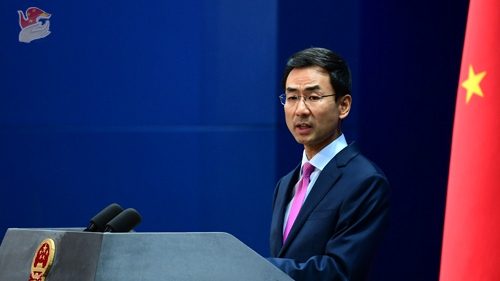

"Today, in the 21st century, international cooperation is a must for technological development, and cultural exchanges are the trends of the times that could not to be stopped," said Geng Shuang, spokesperson for the Chinese Ministry of Foreign Affairs on Monday.
Geng, speaking at a regular press conference, was answering a question by a China Media Group (CMG) reporter about the forced resignation of Chinese American professor Wu Xifeng from a top U.S. cancer research center after working there for 27 years.
Wu, a renowned epidemiologist and a naturalized American citizen, stepped down as the director of the Center for Public Health and Translational Genomics at the University of Texas MD Anderson Cancer Center after months-long investigation by the National Institution of Health (NIH) and the FBI.
The CMG reporter questioned the rightfulness of the investigation and wondered whether the U.S. was hindering bilateral cultural exchanges and technological cooperation by purging scientists.
Geng said some U.S. individuals and organizations have been harassing and making groundless accusations against Chinese scholars and students as well as American scientists of Asian descent, noting that this has severely affected the cooperation and communication between the two countries. Such behavior will eventually damage the interests and image of the U.S. itself, he noted.
"China-U.S. cultural and educational exchanges are significant for the people of the two countries to get to understand each other and to promote the stable development of mutual ties, which are in line with the fundamental interests of both countries," said Geng. "It is ridiculous and a vain attempt to curb China's development by tightening the cultural exchanges."
The spokesperson also mentioned Chinese President Xi Jinping and his U.S. counterpart Donald Trump's meeting at the G20 summit in Osaka last month, during which they reached an important consensus of deepening people-to-people exchanges.
"We hope the U.S. side could treat China's development and China-U.S. ties properly, and stop its wrong deeds of restricting and oppressing cultural communications," said Geng.
"The two sides should work towards the same goal, and make efforts to implement the consensus of the two leaders to strengthen and safeguard the communication and cooperation, so as to lay a steady public and social foundation for coordination, cooperation and stabilization of bilateral ties," he said.

Copyright © 2018 CGTN. Beijing ICP prepared NO.16065310-3
Copyright © 2018 CGTN. Beijing ICP prepared NO.16065310-3